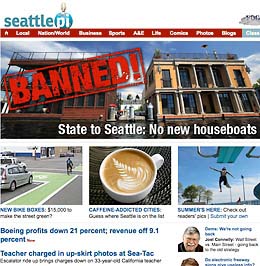On July 27, 2010 the Seattle Post-Intelligencer's news website runs this attention-grabbing banner headline: "BANNED! State to Seattle; No New Houseboats." This is probably surprising news to plenty of casual observers -- but certainly not to the nervous occupants of the town's approximately 500 current houseboats (mainly on Lake Union and Portage Bay), who have been aware that policy changes have been quietly brewing down at City Hall.
Although Seattle has hosted houseboats on its lakes, the Duwamish River, and along Elliott Bay since the 1880s, few of the decades that have passed since then did so without experiencing controversies of one sort or another erupt over the floating homes. Two of the main issues have long been land-use laws and water quality concerns.
The news article informed that: "City planners have drafted rules that would ban new houseboats, limit development, and demote the preferential water-use status currently enjoyed by floating homes" (Ho). As reported, Washington state's Department of Ecology has directed Seattle to review its Shoreline Master Program -- a comprehensive set of rules governing use of Seattle's waterways. This updating -- the first proposed major changes since 1987 -- was sparked by ongoing concerns about the ecology of the waterways as well as by public access goals.
One fisheries biologist and land-use planner with Seattle's Department of Planning and Development (DPD) said, "We've got to balance the protection of the environment with development on the water. There's science that leads us to believe that float structures take away from the habitat for the aquatic species that live in our lakes" (Ho).
The DPD's drafted policy proposals -- which should be ready for public scrutiny in September 2010 -- would, if enacted essentially cap the current level of floating homes, formally ending the long era during which houseboat construction was mainly limited by the availability of moorage sites.

